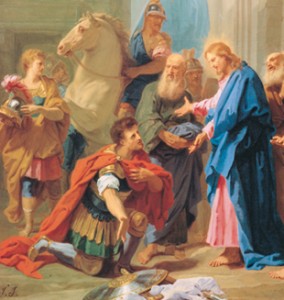 This is an age plagued by self-esteem issues. At the behest of the public schools, the Mass media and the field of psychology, this topic has been front and center for several generations. The general consensus in the City of Man is that everyone needs high self-esteem, deserves high self-esteem and must make high self-esteem the number one priority if we are to attain “happiness.” It is generally believed in this benighted age that one cannot love others unless one loves himself first. However, this type of self-love is an inversion of the self-love Christ calls us to in the second of His twin commandments when he says “love your neighbor as you ought to love yourself.” A proper love of self elevates the Truth above the self because even if the truth hurts, it is better for the self in the long run.
This is an age plagued by self-esteem issues. At the behest of the public schools, the Mass media and the field of psychology, this topic has been front and center for several generations. The general consensus in the City of Man is that everyone needs high self-esteem, deserves high self-esteem and must make high self-esteem the number one priority if we are to attain “happiness.” It is generally believed in this benighted age that one cannot love others unless one loves himself first. However, this type of self-love is an inversion of the self-love Christ calls us to in the second of His twin commandments when he says “love your neighbor as you ought to love yourself.” A proper love of self elevates the Truth above the self because even if the truth hurts, it is better for the self in the long run.
 In the Holy Mass we are quite counter cultural when we truthfully say before we receive the Blessed Sacrament “Lord, I am not worthy that
In the Holy Mass we are quite counter cultural when we truthfully say before we receive the Blessed Sacrament “Lord, I am not worthy that
you should enter under my roof; but only say the word, and my soul shall be healed.” In the most profound sense we are unworthy to receive the Body, Blood, Soul and Divinity of our Lord and Savior. The merciful graces bestowed upon us by the holy presence of Christ in the Eucharist are truly unmerited gifts for the faithful who can recognize their unworthiness in the presence of perfection.
How can we reconcile the secular quest for high self-esteem and the holy ordinance that we are in fact unworthy? Is this not a cognitive dissonance unsettling to our modern sensibilities? Until we sort out the kind of happiness we seek and the kind of esteem we embrace, this is a terribly confusing concept. Let us first look to the Biblical origins of our claim of unworthiness in the Holy Mass.
In Mathew 8:5-13 we read of the centurion who has an ill servant. The centurion is a rich and powerful man possessing all the trappings of material success, authority over many others and surely respected by many more. It would seem by the standards of his day the Centurion was very successful and by the standards of our day we might assume that he had very high self-esteem. He told Jesus of his ill servant and Jesus said that He would go to the Centurion’s house to heal him.
The centurion was a man of great faith and as faith purifies the eye of the soul, he could clearly see that he was in fact not worthy to have the Son of God enter his home. He demonstrated this by his words to Christ when he said “Lord, I am not worthy to have you come under my roof; but only say the word, and my servant will be healed.” Christ marveled at his faith and his clear understanding of his unworthiness.
In a similar way, when we are at Holy Mass, like the centurion we are in the presence of Christ. Because of the after math of the fall of our first parents, we too are “in terrible distress” concerning our spiritual health. At the moment of communion it is as Origen once explained “when we drink and eat the body and blood of our Lord, he enters under our roof.” We too are therefore humbling ourselves as did the Centurion by publically claiming that we are unworthy that Christ should enter us that we might be healed.
 We ought to desire it that God says of us what Christ said of the Centurion in Mathew 8:10, “Truly, I say to you, not even in Israel have I found such faith.” What is better for us, to esteem ourselves? Or to have Christ hold us in high esteem? Do we proclaim our own worthiness? Or take steps that Christ may eventually approve of us? This is our choice. If we are our own standard and we seek our own approval and the approval of others by way of human respect, we may end self-satisfied for a time, but it is sure to be temporary.
We ought to desire it that God says of us what Christ said of the Centurion in Mathew 8:10, “Truly, I say to you, not even in Israel have I found such faith.” What is better for us, to esteem ourselves? Or to have Christ hold us in high esteem? Do we proclaim our own worthiness? Or take steps that Christ may eventually approve of us? This is our choice. If we are our own standard and we seek our own approval and the approval of others by way of human respect, we may end self-satisfied for a time, but it is sure to be temporary.
 Let us let God be our standard. The Centurion had all the worldly goods and powers, servants, riches, respect, but this he counted as nothing in the sight of our Lord and Savior Jesus Christ. Our worth comes from Christ our creator and what is incalculably valuable about us is the gift of His image and likeness imprinted on our souls by way of intellect and will. Accidents of birth, material riches, human respect, these are all fleeting and ephemeral. Christ’s love is real and permanent. Let us abandon our quest for self-esteem and acknowledge with Holy Mother Church that indeed we are not worthy to have Him enter under our roof, and in doing so accept His gracious invitation to be healed as we prepare for eternal beatitude.
Let us let God be our standard. The Centurion had all the worldly goods and powers, servants, riches, respect, but this he counted as nothing in the sight of our Lord and Savior Jesus Christ. Our worth comes from Christ our creator and what is incalculably valuable about us is the gift of His image and likeness imprinted on our souls by way of intellect and will. Accidents of birth, material riches, human respect, these are all fleeting and ephemeral. Christ’s love is real and permanent. Let us abandon our quest for self-esteem and acknowledge with Holy Mother Church that indeed we are not worthy to have Him enter under our roof, and in doing so accept His gracious invitation to be healed as we prepare for eternal beatitude.






2 thoughts on “Lord I am not Worthy!”
And this is why many Christians feel that faith alone heals; that sola scripture is
a valid point, that whenever two or more of you are gathered in My Name …
The centurion is one of the most attractive and gracious figures in all Scripture. It’s worth reflecting first of all on why he should be living in Israel. On retirement at around 45, Roman centurions were given land wherever they chose to support themselves. This Gentile soldier chose Israel, very unusually: at some point, serving in the Land, the Spirit must have given him a great love for Israel, even while doing his duty as a hated occupier. In Luke 7 we learn a lot more. A small time farmer is actually not particularly wealthy. Almost certainly his servant was his only one. The centurion had followed up his love for Israel with sacrificial giving: he had paid entirely for a new synagogue, and won the respect and love of the Jewish elders. It is very likely he had also remained single, giving up the joy of marriage and a family which other retiring centurions would have enjoyed.
He is a sensitive soul. He realizes that his action in sending others on his behalf and staying at home himself could have been misconstrued as rather lordly – he would suffer for how his compatriots normally behaved – so he sends other friends to explain. Perhaps his beautiful humility restrained him from saying that it was also out of love for his servant that he didn’t want to leave him alone for a moment.
Dear, unnamed centurion, pray for us. Pray especially that more hearts are touched with the love you had for the Jewish nation. Pray that we may become as heedless as you of our status or dignity, in loving service of others.